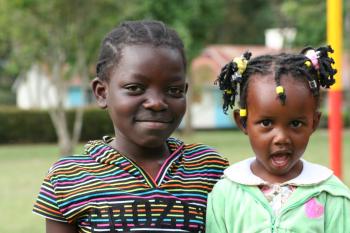Land access is crucial in an agricultural society

Two girls from the children’s village (photo: E. Van Velde).
The surrounding Rift Valley Province is largely agricultural, focusing on cash crop production such as tea, coffee and wheat, as well as small-scale mixed farming. However, the region is also prone to droughts, which, in addition to land degradation and erosion, frequently endanger the livelihoods of the population. Food insecurity has grave effects on all, but affects children most severely: 35 per cent of children in Rift Valley Province suffer from stunting, meaning they are below their age-appropriate height as a direct result of malnutrition.
Policy on land ownership has been a matter of contention in Kenya since colonial days. Today, women especially are at a great disadvantage when it comes to land access, as they usually lose all land rights in cases of divorce, separation or widowhood. The overall distribution of wealth in Kenya continues to be extremely unequal: it currently ranks 143rd – in the lowest quarter – in the Human Development Index, which takes into account health, education and income.
Inequality and lack of education can lead to social tension
The post-election violence that erupted in Kenya in 2007/2008 also affected Eldoret, when targeted ethnic violence against the Kikuyu people caused numerous deaths. The violence continued for several months in Rift Valley Province, and ethnic tensions continue to run high.
Kenya’s Free Primary Education policy, which was implemented from 2003, saw a great improvement in primary school enrolment. However, many are concerned that this has led to a decline in the quality of teaching due to the large class sizes, and the increasing workloads teachers face, combined with inadequate salaries. Another problem is the dilapidated state of many school buildings, especially during the rainy season. Children from poor rural families may have to travel long distances to get to school and in many cases, parents are unable to provide food for the day. This means that many pupils go all day without eating, which has a detrimental effect not only on their health but also on their learning. The enrolment rate for secondary school remains very low, especially in rural areas.
Kenya’s Free Primary Education policy, which was implemented from 2003, saw a great improvement in primary school enrolment. However, many are concerned that this has led to a decline in the quality of teaching due to the large class sizes, and the increasing workloads teachers face, combined with inadequate salaries. Another problem is the dilapidated state of many school buildings, especially during the rainy season. Children from poor rural families may have to travel long distances to get to school and in many cases, parents are unable to provide food for the day. This means that many pupils go all day without eating, which has a detrimental effect not only on their health but also on their learning. The enrolment rate for secondary school remains very low, especially in rural areas.
What we do in Eldoret

Thumbs up for the kindergarten children in Eldoret (photo: M. Peru).
For children from the region who can no longer live with their parents, 15 SOS families can provide a loving home for up to 120 children. In each family, the children live with their brothers and sisters, affectionately cared for by their SOS mother.
The children attend the SOS Kindergarten together with children from the neighbourhood. This ensures that children from SOS families make friends and are integrated into the local community from a young age. The children then go on to complete their primary and secondary education at the SOS Hermann Gmeiner School in Eldoret.
When young people from the SOS Children’s Village feel ready to move out of the family home in order to pursue further education or vocational training, the SOS Youth Programme makes shared accommodation available. The young people live together and, with the support of a qualified counsellor, they learn to take responsibility, plan for their future and prepare for independent adult life.